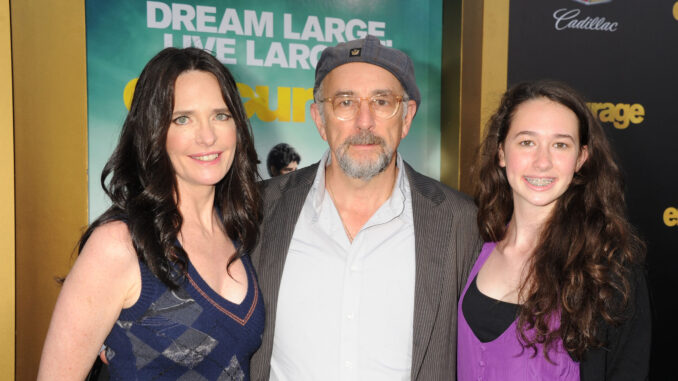
The Good Doctor marches toward its poignant series finale, Season 7 has not shied away from tackling emotional intensity—and Episode 8, “The Overview Effect,” is a shining example. But beyond the fictional drama playing out on-screen, there’s a deeply personal story unfolding behind the scenes: the character Hannah Ayleston, introduced as a patient battling addiction, is portrayed by Ruby Kelley, the real-life daughter of Richard Schiff, who plays the emotionally complex Dr. Aaron Glassman.
Ruby Kelley may be a fresh face to many viewers of The Good Doctor, but in Episode 8, she delivers a quietly powerful performance that belies her years. As Hannah Ayleston, she portrays a young woman battling chronic pain and the hospital system’s skepticism about addiction. The role is challenging, nuanced, and emotionally layered. Hannah is initially dismissed by hospital staff as someone “drug-seeking”—a painful and all-too-familiar label in the real world of medicine. But as her story unfolds, it becomes clear she’s experiencing genuine medical pain, likely due to an undiagnosed condition like Chiari malformation. When Dr. Glassman sees the truth behind her suffering, he steps in—not just as a physician, but as someone emotionally invested.
The most compelling aspect of Hannah’s storyline, though, comes from the reality behind the casting: Ruby Kelley is Richard Schiff’s daughter. That real-life bond translates beautifully into their scenes together. Their chemistry is organic, unforced. It’s the kind of emotional shorthand that only decades of shared life experience can produce. Their scenes in Episode 8 don’t come off as actors playing parts. They feel lived-in, almost like watching a father desperately trying to save a daughter from the same tragic fate he once couldn’t prevent—Glassman’s own daughter Maddie died from addiction. Schiff brings a weight of sorrow and urgency to his performance, and Kelley responds with guarded vulnerability that never drifts into melodrama.

In one pivotal moment, Glassman chooses to procure pain medication for Hannah, bypassing hospital regulations. It’s a career-risking move that speaks volumes—not just about his guilt over Maddie, but about his refusal to let history repeat itself. Watching Schiff and Kelley navigate this ethical and emotional territory feels less like fiction and more like a deeply human exchange.
Richard Schiff has long been one of the show’s emotional anchors. As Dr. Glassman, he’s navigated brain cancer, the loss of his daughter, and the challenges of mentoring Shaun Murphy. But his interactions with Hannah give his arc a renewed sense of purpose. It’s no coincidence that in the final season, just as Glassman begins to reflect on his legacy, a figure like Hannah enters his life. She represents everything he failed to do for Maddie—and perhaps the final opportunity to make peace with himself. His decision to help her, though ethically questionable, is deeply human.
With her breakout appearance, Ruby Kelley has signaled that she may be ready for more roles in the spotlight. Her naturalistic style, emotional depth, and quiet charisma make her stand out—not just because of her last name, but because of her talent. Fans and critics alike have called for her return in the final episodes or in potential spin-offs, and her performance suggests she could handle recurring roles or lead characters in future projects. Whether or not she continues acting, one thing is clear: her work on The Good Doctor has left a lasting impression.
TV dramas often rely on heightened stakes, dramatic twists, and heavy-handed emotion. But in “The Overview Effect,” The Good Doctor proves that sometimes the most powerful scenes are those grounded in real feeling. Ruby Kelley and Richard Schiff didn’t need special effects or grand speeches. They only needed to look at each other—and viewers could feel everything. Their performances reminded audiences that stories about medicine are really stories about people. About trying to heal not just bodies, but wounds that stretch far beyond the physical.
As The Good Doctor nears its end, the introduction of Hannah Ayleston could have been just another patient case. Instead, thanks to Ruby Kelley’s authentic performance and her undeniable connection to Richard Schiff, the character becomes a linchpin of the season’s emotional journey.More than just a casting choice, Kelley’s role serves as a love letter to the idea that real life and fiction don’t have to be separate—and sometimes, the most powerful storytelling comes from places that are deeply, achingly real.
